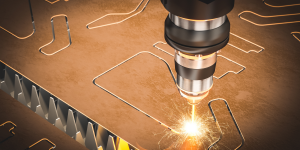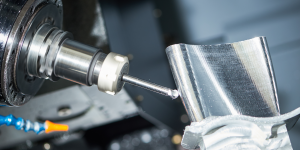Cette forme de plastique d'usinage CNC est distincte en soi car il faut des connaissances et des compétences spécifiques pour obtenir des résultats optimaux. Soit vous êtes un machiniste débutant, soit un expert, mais l'objet: c'est réussir à travailler avec des matériaux plastiques, Vous devez perfectionner les subtilités impliquées. Cet article met en évidence 8 Perles de sagesse précieuses qui, Si suivi à la lettre; vous permettrait d'affiner votre processus d'usinage CNC en plastique. Les informations de la sélection des matériaux aux considérations d'outillage vous permettront de vous arder des connaissances essentielles pour la précision et l'efficacité de l'usinage en plastique.
Sélection des matériaux:
Dans le cas du plastique d'usinage CNC, La sélection des matériaux est un facteur crucial qui a un impact sur la question de savoir si votre effort pour la machine réussira ou échouera. La connaissance des caractéristiques possédées par divers plastiques et leur application à une utilisation spécifique est importante. Résistance à la chaleur, compatibilité chimique, et la stabilité dimensionnelle doit être prise en compte lors de la sélection du bon matériau plastique pour votre application d'usinage CNC. Plus loin, Des considérations telles que la machinabilité et les spécifications de finition de surface doivent également être considérées pour obtenir les meilleurs résultats. Choisir le bon matériau plastique pour votre Usinage CNC Le processus assure la précision, efficacité, et de meilleurs résultats.

Considérations d'outils:
En termes d'usinage plastique CNC, Les aspects d'outillage jouent un rôle essentiel dans la réalisation des meilleurs résultats. Le choix des outils appropriés et des paramètres de coupe a un effet substantiel sur la qualité et la productivité de l'usinage. Matériau à outils, géométrie de l'outil, et le revêtement est tous des facteurs cruciaux pour déterminer les performances d'un outil particulier ainsi que sa capacité à produire des pièces de qualité. Aussi, Il est indispensable de savoir ce que nécessite le matériau plastique qui a besoin d'usinage afin de choisir les bons outils et les méthodes d'usinage. Grâce à une considération d'outillage réfléchie et à une adaptation à la nature spécifique des matériaux plastiques, Les machinistes peuvent optimiser la précision et les performances lors de l'utilisation des machines CNC.
Techniques de travail:
Les techniques de travail jouent un rôle important dans le plastique d'usinage CNC, car ils influencent directement la précision et la productivité d'un processus. Le choix de méthodes et de luminaires appropriés est essentiel pour assurer la stabilité ainsi que la précision d'une pièce en plastique tout en faisant l'usinage. Les propriétés du matériau, géométrie en partie, et les opérations d'usinage doivent être pris en compte réfléchies lors de la sélection des meilleures méthodes de maintien du travail. De plus, Il est essentiel de fournir les bonnes forces de serrage et le soutien aux pièces en plastique pour éviter les vibrations et les distorsions qui produiront de meilleurs résultats d'usinage.
Paramètres d'usinage:
L'optimisation des paramètres d'usinage est l'un des points clés qui peuvent être mentionnés lors de la conception des machines CNC, Travailler avec du plastique. Cependant, Le choix des vitesses de coupe Taux d'alimentation, et les profondeurs de coupe affectent fortement la production de qualité des produits usinés ainsi que le processus de totalité de la productivité. La sélection de paramètres d'usinage tels que les caractéristiques particulières du matériau plastique, outillage, et la finition attendue nécessite une analyse approfondie. Y compris plus, La connaissance des propriétés thermiques et du comportement de formation des puces d'un matériau plastique jouent un rôle important dans la détermination des paramètres d'usinage optimaux qui conduisent à une génération de chaleur minimale assurant des résultats exacts avec le moindre usure d'outil. Il faut souvent une expérimentation et une analyse réfléchies pour déterminer les paramètres d'usinage pour différents matériaux plastiques et la géométrie en partie entraînant des performances améliorées lors de l'usinage avec un produit de meilleure qualité.
Refroidissement et lubrification:
Du point de vue du plastique d'usinage CNC, refroidissement, et la lubrification est appliquée pour continuer dans divers domaines garantissant la qualité ainsi que les mécanismes d'efficacité. L'ensemble des opérations d'usinage en plastique nécessite un refroidissement et une lubrification efficaces comme un moyen de supprimer la production de chaleur, Extraction du taux d'usure sur les bords de coupe de l'outil ou la surface dentaire, Et même réaliser une meilleure suppression des puces. Des problèmes comme la conductivité thermique et les caractéristiques de dissipation thermique du matériau plastique, ainsi que des paramètres de coupe spécifiques utilisés doivent être comprises de manière optimale pour déterminer les mécanismes de refroidissement et de lubrification appropriés. Aussi, Le choix des fluides de coupe et des méthodes de livraison de liquide de refroidissement appropriés compatibles avec les besoins d'usinage en plastique peut considérablement améliorer la valeur de rugosité de finition de surface tout en montrant des progrès significatifs en matière de précision dimensionnelle des produits de finition de la température appropriée Le contrôle de pointe et la lubrification peut aider les machinistes à surmonter les défis d'accumulation de chaleur en raison des dépendances créées par une exposition accrue à des températures élevées ainsi qu'aux effets d'usure des outils, ce qui, Amélioration des performances en termes d'efficacité de l'usinage en ce qui concerne la qualité des pièces incorporées
Contrôle et évacuation des puces:
Presque tout ce qui concerne l'usinage CNC des plastiques est associé à la commande et à l'évacuation des puces, qui peut être considéré comme des éléments clés déterminant la précision globale que le point focal fait référence à sa stabilité de traitement. Si les puces résultant des processus d'usinage en plastique ne sont pas bien gérées, Des problèmes tels que la récupération de l'outil de coupe provoquent des problèmes tels que la formation de bords de la puce et les dommages aux outils peuvent être répandus. Considération de problèmes comme la nature, géométrie, et d'autres caractéristiques associées aux matériaux plastiques utilisés ainsi qu'aux paramètres de coupe des effets, y compris les géométries de l'outil, jouent un rôle important pour assurer un contrôle optimal des puces.
Exigences de finition de surface:
Il faut beaucoup de connaissances des facteurs affectant la qualité de la surface et l'application des bonnes techniques pour obtenir la finition requise dans le plastique d'usinage CNC. Les exigences de finition de surface pour les pièces en plastique peuvent différer en fonction de l'application cible, caractéristiques du matériau, et spécifications de conception. Géométrie de l'outil, paramètres de coupe, et les techniques de refroidissement / lubrification jouent également un rôle important dans la décision de la finition de surface des pièces en plastique usinées. En outre, Le choix des stratégies d'usinage appropriées, par exemple, le broyage de montée ou le fraisage conventionnel joue un rôle important dans la texture de surface finale et la précision dimensionnelle. Grâce à une attention particulière aux spécifications de finition de surface et aux ajustements précis des processus d'usinage selon certains critères, Les composants en plastique peuvent être fabriqués qui répondent aux caractéristiques requises.

Considérations post-accumulation:
Les considérations post-machine sont d'une importance primordiale pour le plastique usiné CNC car la qualité et les performances des pièces finales en dépendent. Une fois le processus d'usinage terminé, il est nécessaire d'évaluer la tolérance dimensionnelle, État de finition de surface, et la qualité globale des pièces afin de s'assurer que toutes les spécifications sont respectées. En outre, poste-inspections d'usinage et le contrôle de la qualité doit être effectué afin d'identifier tout défaut ou écart possible par rapport aux spécifications. En outre, en tenant compte de toutes les procédures de post-traitement requises comme le déburlateur, nettoyage, ou les traitements de surface sont obligatoires pour préparer les pièces en plastique usinées pour leur application finale. En considérant avec diligence, Les machinistes peuvent garantir la conformité aux normes de précision et de qualité dans leurs opérations d'usinage CNC.
Conclusion
Le plastique d'usinage CNC implique des considérations et des problèmes spéciaux qui doivent être compris en détail, y compris les propriétés des matériaux, Aspects d'outillage, paramètres d'usinage ainsi que des techniques de post-traitement. Avec 8 Nuggets cruciaux des connaissances discutées dans ce post, Les machinistes peuvent affiner leurs processus d'usinage en plastique pour obtenir des pièces de qualité supérieures avec une précision et une efficacité dimensionnelles. Compte tenu de l'accent mis sur l'exactitude et les détails, Perfectionner les compétences du plastique d'usinage CNC peut entraîner des résultats exceptionnels et une augmentation des capacités de fabrication.
